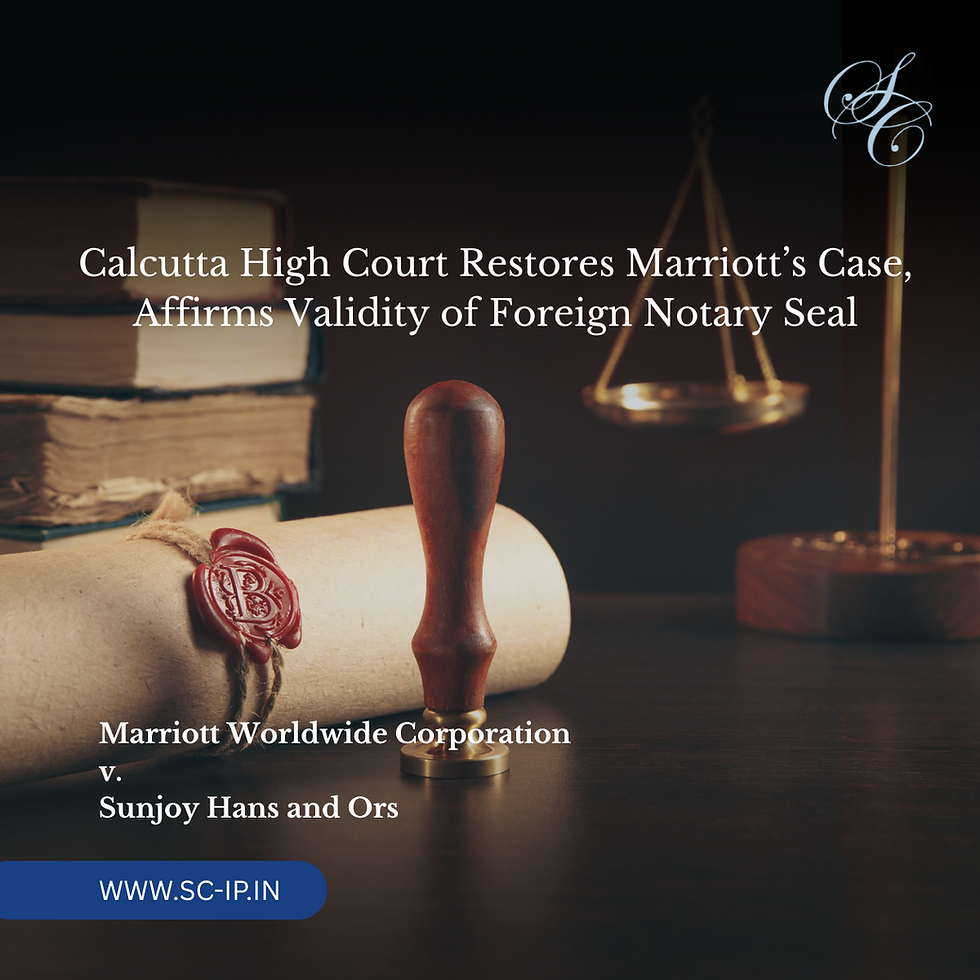Marriott Worldwide Corporation v. Sunjoy Hans and Ors.
- SC IP
- Aug 20, 2025
- 2 min read

Recently, the Hon’ble Calcutta High Court, in an appeal under Section 91 of the Trade Marks Act, 1999, set aside an order passed by the Deputy Registrar of Trademarks, whereby Marriott Worldwide Corporation’s (“Petitioner”) opposition against the registration of a deceptively similar trade mark THE NEW MARRION, by Sunjoy Hans (“Respondent”) was dismissed on the ground that the evidence filed by the Petitioner in support of the opposition was not apostilled in accordance with law.
The Petitioner is a well-known brand engaged in the business of providing hospitality and related services. The Petitioner first adopted the trade mark MARRIOTT, in 1957 and 1992, worldwide and in India, respectively, and has been continuously using it since then. The Petitioner’s earliest registration for its trade mark MARRIOTT in India dates back to 1992. On November 8, 2022, the Respondent filed an application to register the trade mark THE NEW MARRION, on and in relation to similar services, i.e., hospitality services, claiming use since October 12, 2000.
It was the Petitioner’s case that the Registrar dismissed the opposition on the ground that the affidavit in support thereof had not been apostilled in accordance with law, which, according to the Petitioner, constituted a grave violation of the principles of natural justice. It was further contended by the Petitioner that the Registrar completely disregarded the Petitioner’s affidavit despite the fact that it was notarized before the Notary Public of the place where it was executed, i.e., Maryland, the U.S.A, which was unjustifiably and arbitrarily not taken on record. The Respondent, on the other hand, contended that the appeal was infructuous as the statutory authorities were well within their rights not to place reliance on the Petitioner’s affidavit.
The Court opined that, given that the affidavit was notarized before the Notary Public of the U.S.A., there was no further requirement for the government to issue a notice under Section 14 of the Notaries Act, 1952 (a notification issued by the government to recognize notarial acts performed by notaries in foreign countries). The Court observed that, in terms of Rule 120(3)(b) of the Trade Marks Rules, 2017, affidavits duly notarized in any country outside India before a Notary Public of that country are valid and admissible, and such special statutory provisions must prevail over general law. The Court further clarified that the Notaries Act, 1952 does not impose any embargo on accepting such evidence, and that under the Indian Evidence Act, 1872, there exists a presumption as to the genuineness of the seal and signature of the foreign Notary. Therefore, the Court set aside the impugned order of the Registrar and remanded the matter for fresh adjudication, directing that the opposition be heard on merits, and the evidence filed by the Petitioner be duly taken on record.




Comments